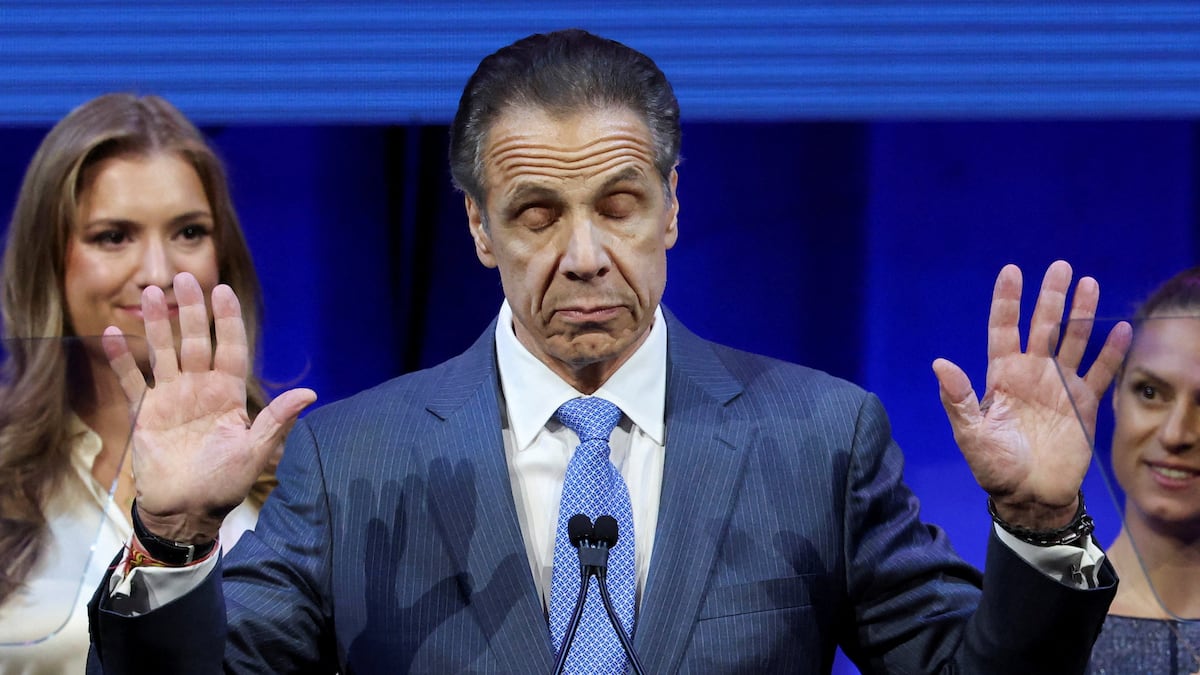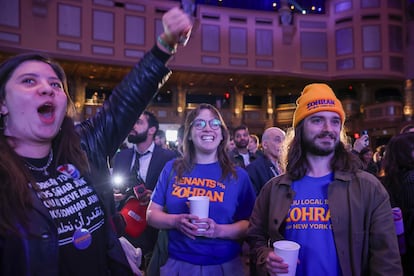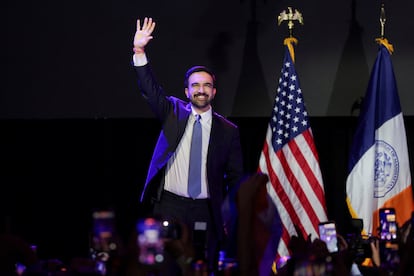Zohran Mamdani, the Democratic candidate for mayor of New York who has managed to embody in record time both the hope for change in Donald Trump's America and the challenge to his party's established power, made history this Tuesday. At 34, Mamdani becomes the first socialist to govern the world capital of capitalism and the first Muslim mayor of the city that suffered the 9/11 terrorist attacks. He is also the youngest to achieve this in a century.
His victory has few precedents in a city that has elected 110 mayors before him—only a handful of them immigrants—and where almost no one knew him just a year ago. Back then, he was just another member of the Albany State Assembly. From that unassuming position, Mamdani traveled at breakneck speed toward global fame on the back of a left-wing platform—sensible or populist, depending on your perspective—based on a commitment to affordability that proved irresistible this Tuesday for those residents who are being pushed little by little beyond their limits by the most populous city in the country (8.8 million inhabitants), which also happens to be one of the most expensive in the world.
The new mayor, the first citizen with South Asian roots to claim the mayoral office in New York City, did so thanks to a dazzling campaign, bolstered by an extraordinary command of social media, which he demonstrated once again at the moment of his victory. It took just 45 minutes for major US media outlets, including the Associated Press, to declare him the winner after the polls closed at 9:00 p.m., and then his social media account released a simple 10-second video. It shows the interior of one of the city's distinctive subway cars and a sign for the City Hall station. A voice announces to commuters: “The next and final stop is City Hall.”
These attention-grabbing tactics, which Mamdani, or his campaign, deliver with apparent ease, are complemented by an old-fashioned charisma, reminiscent of those politicians in movies, comfortable in the close quarters of selfies, shaking hands and kissing babies. With this combination, Mamdani managed to inspire an army of some 100,000 volunteers—a movement that emerged in just a few months—who knocked on more than three million doors to ask for votes for the candidate and reiterate a platform with three key points: free buses, a freeze on rent control until 2030, and free childcare for children under five.
Those simple ideas, which he repeated in his victory speech at a Brooklyn theater before an enthusiastically chanting crowd, led to his resounding and unexpected win in the Democratic primaries in June. They also dominated Tuesday's election, which saw a record turnout of two million people—unseen since 1969—winning over voters and overcoming objections from his opponents.
These groups, led by President Donald Trump, tried to portray him as an unrepentant anti-Semite (because of his support for Palestine and his condemnation of the “genocide” in Gaza) and an apologist for Islamist terrorism. Above all, they presented him as a dangerous communist, ready to bankrupt the city and plunge it back into its worst nightmares, to the dark years of rampant crime decades ago.
It will be from January 1st, the day the new mayor is sworn in, that it will be possible to see if those fears about Mamdani are well-founded or merely the specters conjured up by the city's established power—from big business to rentiers, and from Wall Street sharks to pro-Israel activists and cultural mandarins—to stop a candidate who proved unstoppable, especially, though not exclusively, among young people.

“I am a Muslim. I am a democratic socialist. And I refuse to apologize for it,” he proclaimed in his speech, in which he directly challenged the President of the United States. “I know you are watching. I have only three words for you: Turn up the volume!” “New York will continue to be a city of immigrants, built by immigrants, and powered by immigrants. And, starting tonight, led by an immigrant.”
Mamdani easily defeated his rivals (50.4% of the vote), who, it must be acknowledged, were not the strongest contenders. The main one was former Democratic Governor of New York State, Andrew Cuomo (41.6%), who had pinned his hopes on this election for a political comeback after an ignominious resignation in 2021 from a decades-long career, hounded by a sexual harassment scandal. Neither he—with his pedigree (he is the son of another governor, Mario Cuomo), his old-school image, and his close ties to economic power and the Democratic Party establishment—nor Curtis Sliwa (7.1%)—the Republican candidate who never had a real chance in a traditionally progressive state—could defeat Mamdani, even though Trump endorsed Cuomo on Monday. Or perhaps it was precisely because of that.
Inauguration in January
Born in Kampala, Uganda, in 1991 to intellectuals—Indian filmmaker Mira Nair and Columbia University professor Mahmoud Mamdani—the new mayor of New York City also embodies the rise of the Democratic Socialists of America (DSA), a more left-leaning alternative to the Democratic Party. This party emerged in response to inequality and unchecked capitalism, fueled by the disappointment of Hillary Clinton's defeat to Donald Trump in 2016, and inspired by the example of Vermont Senator Bernie Sanders' presidential campaign.

It already bore its first fruits on the national stage with the emergence in 2018—the same year, incidentally, that Mamdani obtained citizenship—of Alexandria Ocasio-Cortez. She, like the new mayor, is heir to a tradition that has its roots in the 1920s—with the socialist presidential candidate Eugene Debs—draws on the principles of Franklin D. Roosevelt's New Deal, and has a direct antecedent in those who took to the streets of Manhattan after the 2008 crisis to occupy Wall Street.
For a Democratic Party mired in an existential crisis since Kamala Harris's defeat in November 2014, Mamdani's unexpected rise is a jolt that compels its leadership to engage in a debate about the future. This debate must also consider the lessons learned from the other resounding Democratic victories of the night in the gubernatorial elections in Virginia and New Jersey, states where two moderate candidates, Abigail Spanberger and Mikie Sherrill, swept the board. Does Mamdani's triumph indicate that voters are eager for a generational shift and more progressive policies? Or is it a mistake to conclude that what one major city has to say can be extrapolated to the rest of the country, where prudence has, for decades, led candidates to travel to the center to win over undecided voters?
What the example of the mayor-elect of New York seems to confirm is that it is no longer possible, if it ever was, to win a high-stakes election in the United States within the strict confines of traditional parties. And that in the age of social media, only those who can wield different shades of populism, from the left or the right, will have a chance at the polls.
In that respect, Mamdani resembles Trump, with whom the socialist candidate has not been afraid to compare himself: he often insists that what led him to aspire to the mayoralty of New York —with his past as an unsuccessful rapper, whose stage name, Mr. Cardamom, was also a nod to his identity— was the same thing that made the Republican return to the White House a year ago: the certainty that the cost of living had become unbearable for Americans.
One of the big questions now in New York is how Trump plans to respond to Mamdani's victory. First, the president rushed to distance himself from the Republican defeats on social media. Then he posted a cryptic message that read:"Well, here we go." The Republican has threatened to cut federal funding to the city to a bare minimum, and no one can rule out the possibility that he will eventually send the National Guard into the streets of New York, as he has done in Los Angeles and Washington, among other cities.

Mamdani began and ended the day he became mayor by promising to stand up to Trump. In the morning, he did so at the start of a splendid autumn day in New York in a public park in Queens, after voting alongside his wife, illustrator Rama Duwaji, at a polling station in their neighborhood, Astoria.
This time, he wasn't wearing the skinny tie that had become an indispensable part of his uniform in recent months, a tie that complements a black suit and his broad, ever-present smile. Knowing his mastery of messaging, this detail could only mean one thing: after a grueling year-long campaign, Mamdani was ready to stop courting his neighbors and sit back and wait for them to give him the support he needed to make New York history. Well, before the day was out, he did.
